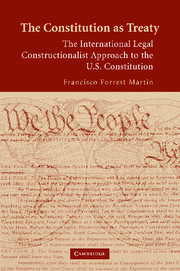 The Constitution as Treaty
The Constitution as Treaty PART III - UNITED STATES LAW AS INTERNATIONAL LAW
Published online by Cambridge University Press: 27 July 2009
Summary
In Part III, this book will internationalize U.S. law. As demonstrated in Part I, the U.S. federal court system is an international tribunal system with interstate and national dimensions. In Part II, this book provided a transitional discussion of international law in general in order to provide a template against which to analyze U.S. law. In Part III, this book will demonstrate that U.S. federal law is international law with interstate and national dimensions. Like other international tribunals, U.S. federal tribunals exercise jurisdiction over positive international law claims and sometimes even natural law of nations claims. In exercising such jurisdictions, both international and U.S. federal tribunals have developed a number of interpretive principles. In the following chapters, we will examine these how these jurisdictions and principles overlap and differ.
The U.S. federal courts exercise both federal law claims and party-based jurisdictions. The judicial power of the federal courts is set out in Article III of the Constitution, which states in relevant part:
The judicial Power shall extend to all Cases, in Law and Equity, arising under this Constitution, the Laws of the United States, and Treaties made, or which shall be made, under their Authority; – to all Cases affecting Ambassadors, other public Ministers and Consuls; – to all Cases of admiralty and maritime Jurisdiction; – to Controversies to which the United States shall be a Party; – to Controversies between two or more States; – between a State and Citizens of another State;[] – between Citizens of different States, – between Citizens of the same State claiming Lands under Grants of different States, and between a State, or the Citizens thereof, and foreign States, Citizens or Subjects.
- Type
- Chapter
- Information
- The Constitution as TreatyThe International Legal Constructionalist Approach to the U.S. Constitution, pp. 105 - 106Publisher: Cambridge University PressPrint publication year: 2007


